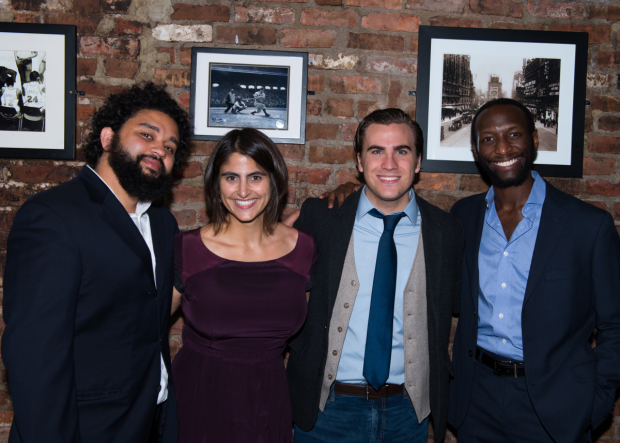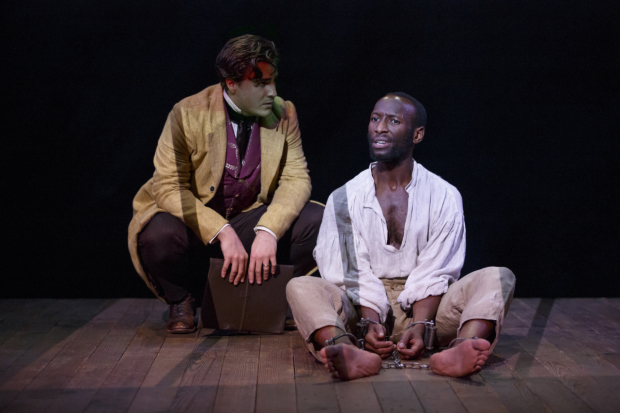Nat Turner in Jerusalem's Playwright and Star Discuss Faith and Legacy of Slavery
The new play, presented by New York Theater Workshop, is a fictionalized account of the rebellion leader’s final night on earth.
Nathan Alan Davis was inspired to write a play based on the bloody 1831 slave uprising known as the Southampton Insurrection after reading Thomas R. Gray's The Confessions of Nat Turner, a book considered the primary historical document regarding the legendary rebellion leader. Despite feeling the spark of inspiration, Davis just wasn't sure he could make it work. After writing one draft (which was eventually almost entirely trashed), he hit upon the idea of creating a developmental lab environment. With the help of New York Theater Workshop, where Davis was a 2050 Fellow, he brought together actors Phillip James Brannon and Rowan Vickers along with director Megan Sandberg-Zakian, and the four worked together to nail down the script — all in less than a week.
That group of artists from the workshop now make up the team presenting Nat Turner in Jerusalem, a fictionalized look at the relationship between Nat Turner and Thomas Gray, told through the lens of a fabricated meeting the night before Turner's execution. The made-up nature of the event, said Davis, is exactly what he needed to crack his story open. "That gave some freedom for us to embrace history, but also embrace sort of the poetry and magic of what that night might have been and really try to find the humanity of that moment," he explained. Davis and Brannon walked us through the creation of the story behind Nat Turner's final hours.

(photo provided by New York Theatre Workshop/© Allison Stock)
Tell me about the two characters in this play.
Phillip: Nat Turner was, and is in our play, a preacher and a revolutionary. He's a bit of a mystic and a man of faith. It's the night before he's about to be executed, and he's experiencing incredible doubt, wondering how his works will be judged on earth after he's gone. He believed he was an instrument of God, and on this last night, he's questioning how this work that he did will be judged by people after he's gone.
Nathan: Thomas R. Gray [author of The Confessions of Nat Turner] is a lawyer who represented several of the people who were tried and executed as part of the insurrection, somebody who is sort of making his way down the social ladder. And he sort of seized the opportunity to create this document about Nat. So his interaction with Nat is something that I was interested in. What are the possibilities for that? The two of them speaking in this place sort of explores what that might have been or could have been.
In the play, what is the relationship between the two men?
Phillip: They need something from each other. Nat wanted his story to be told. So I think it was very exciting for him to have there be a record of it. But then there was the question of how will it be told? Who is this person who's going to tell my story? How are they going to make me seem?
Nathan: One of the things that struck me about the document itself is that there were opportunities for Thomas R. Gray to completely defame Nat Turner's character and he didn't. People claimed that Nat was drunk and just wanted to cause a bunch of havoc and run away to freedom. But Gray said he's never drunk a drop of spirits in his life and he's not a coward. So not to say that he was by any means championing Nat Turner, but he did admit that he was one of the most intelligent people that he had ever met. He was able to see firsthand how powerful and charismatic Nat Turner was. And so I think there's space in the play for both the distance and also the intimacy to happen.

(© Allison Stock)
What themes stick out for you?
Phillip: One of the difficult things that people grapple with is this idea of holy vengeance in the play, the sort of eye-for-an-eye thing. So many lives were taken in slavery over the course of 400 years, but in this night there were babies killed. And people have a hard time grappling with who was right or is it OK. Even if they're with Nat Turner for a little while, they come back to the image of babies being killed. But when I remind them of the 400 years' worth of babies that were killed, they pause. So it's a tough conversation.
Nathan: I think for me the challenge that I have embraced as I work on the play is to present the story as much as I know it and to not be afraid to look at the whole story. Because the play deals with all that, it makes me reflect on all of it, which is tough. But I guess it's also the work of being human in the world we're living in.
Did you envision it as a timely play, considering the discussions about race we're having today?
Phillip: I think it's always been timely. Like, I think if Nathan wrote this five or ten or twenty years ago it would have been just as timely, and I think it will be [just as timely] in probably the next thirty or fifty years. The things that Nat Turner is talking about in the play and the kind of equality that he wants — the respect for all human souls — is still something that we're working on and that we've been working on.
Nathan: Certainly it's set in 1831, but it doesn't seem like these issues that the play deals with are distant at all. It seems like the things that we're dealing with right now. I think any period in history, we're looking at it through our own lens, and it tells us more about where we are than necessarily what it was like then.

(© Joan Marcus)









